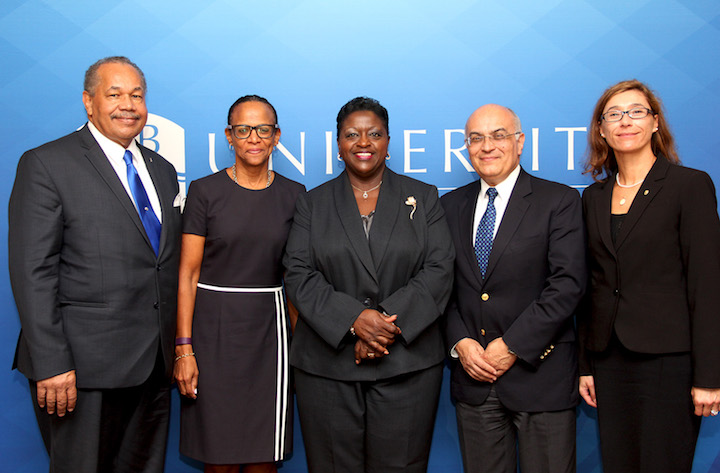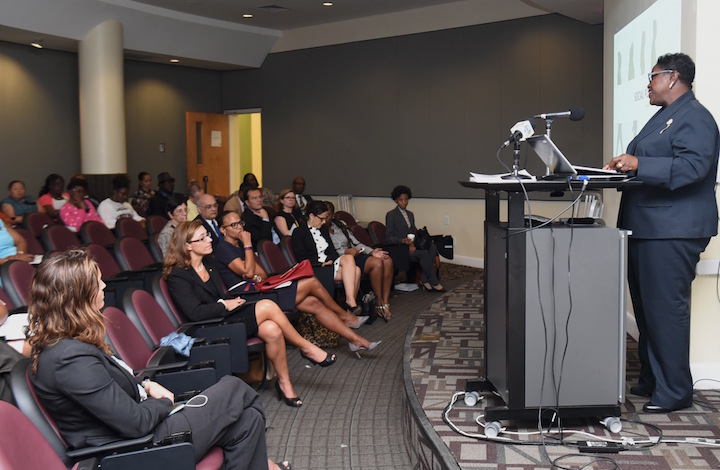|
From:TheBahamasWeekly.com Bahamas Information Services Updates
NASSAU, The Bahamas – The implementation of the country’s first Conditional Cash Transfer (CCT) Programme through the R.I.S.E. Programme will further facilitate the country’s push towards reformation of the Social Safety Net programme within The Bahamas. Minister of Social Services and Community Development, the Hon. Melanie Sharon Griffin said The Bahamas is “well on its way” to reformation of the country’s Social Safety Net programme following the introduction of Visa Pre-Paid Cards in November 2014, and with the impending introduction of the R.I.S.E. Programme and the R.I.S.E. Pre-Paid Cards. Clients of the Department of Social Services on the majority of the inhabited islands of The Bahamas are in receipt of Visa Pre-Paid Cards. Qualified clients residing on Acklins will receive their Cards at the end of March 2017, ensuring one hundred per cent card coverage in The Bahamas. Addressing the Caribbean Regional Launch and Presentation of two key publications by the Inter-American Bank (IBD) at the Harry C. Moore Library Auditorium and Information Centre, University of The Bahamas, February 16, Mrs. Griffin said the launch of the Visa Pre-Paid Cards in partnership with the Bank of The Bahamas was the precursor to the implementation of the country’s Conditional Cash Transfer programme, known by its acronym, R.I.S.E. -- Renewing, Inspiring, Sustaining, Empowering. The R.I.S.E. Programme is already in its pilot stage and targeted clients have been issued R.I.S.E. Pre-Paid Cards that consolidate several of the country’s major social assistance programmes. The R.I.S.E. Programme will address critical areas such as poverty alleviation or reduction and promoting healthier lifestyles; it will look at aspects of education such as attendance, grade point average and successful graduation from High School. “These are all indicators that, when the data is captured and analyzed, will show us the path of our nation, more so, its future, economically,” Mrs. Griffin said.
The Programme, which is “aimed at breaking the cycle of poverty in which generations of Bahamian families find themselves trapped,” also calls for qualified clients to receive Burial Assistance, medical cards for use at public hospitals and clinics as well as enrolment in the School Lunch Programme (children who are students). Social Services officials say the R.I.S.E. Programme “is not a series of hand-outs” as beneficiaries must meet a series of conditions. These include ensuring that their child’s/children’s school attendance is 90 per cent or greater for the school year, and that their child/children attend tutoring sessions when Grade Point Average drops below 2.0. Pregnant mothers benefitting from the programme must also attend prenatal clinics during their pregnancies. Other conditions call for mandatory attendance for parents at Parenting and Nutritional Classes. Minister Griffin said the health and education components have been factored into the equation for a major reason. “We believe that a family is better equipped to take advantage of employment opportunities when the children are healthier and better educated. For us as a people, the adoption of a healthier approach to living and specifically shopping for healthier food items may prove challenging at first, however, there are strategies that we can use to mitigate the adjustment. Improvements in all of the areas that have been set as conditions will not only bode well for the beneficiaries, but for our nation as a whole.” Mrs. Griffin said the modernization process is a far cry from the early days – beginning with the advent of Ministerial Government in The Bahamas. At that time, persons received food rations consisting of non-perishable items such as rice, grits, tuna, corned beef, cream, tea, sugar, shortening and tomato paste. The Department of Social Services, which still has oversight of the social assistance programmes, was responsible for purchasing the items and sorting them in parcels. Clients either visited the office to collect those parcels or the parcels were delivered to clients living in isolated areas. In later years, the delivery of assistance evolved into a paper driven system with the introduction of food coupons of varying monetary value, depending on the number of dependents in each household. The coupons were distributed on a monthly basis to be redeemed at participating merchants. Mrs. Griffin said The Bahamas, like other Developing Countries, recognized that the delivery “of the aforementioned services could not continue in that form given it was paper intensive, open to fraud, and not client friendly as clients were being subjected to long lines and long waiting periods in addition to the fact that the increase in population over the years also impacted the number of persons seeking assistance.” Two Living Condition Surveys conducted in 2001 and 2004 with assistance from the IDB conducted an assessment of The Bahamas’ social safety net from which the Bahamas Social Safety Net report was produced. The 2004 Assessment and Report, were facilitated by Dr. Lorraine Blank. That report suggested, among other recommendations, the need for better targeting of beneficiaries; consolidation of programmes; reform and capacity building in the Department of Social Services; and the need to make benefits conditional on activities that promote human capital development – a key component of the plan. The R.I.S.E. Programme is expected to accomplish all of these objectives.
|

